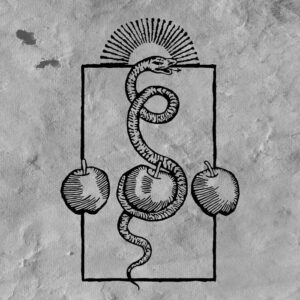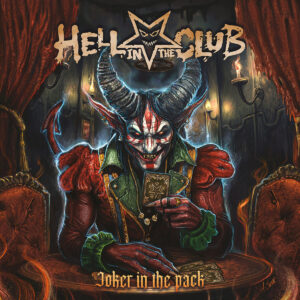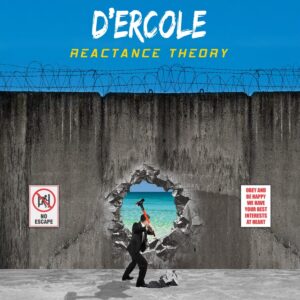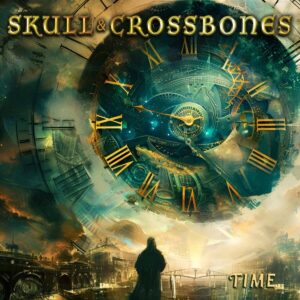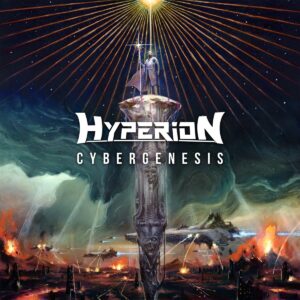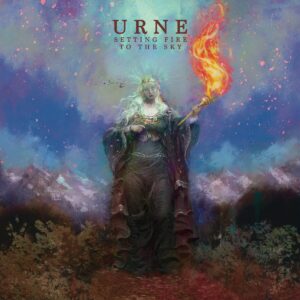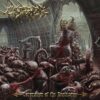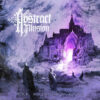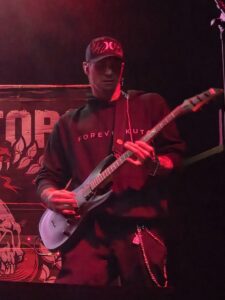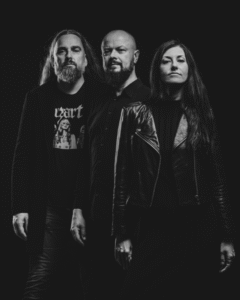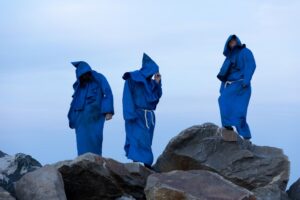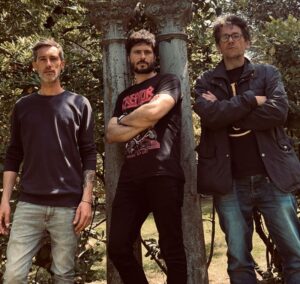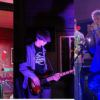Aaron Brancheau and Sami Wolf
Moon Wizard
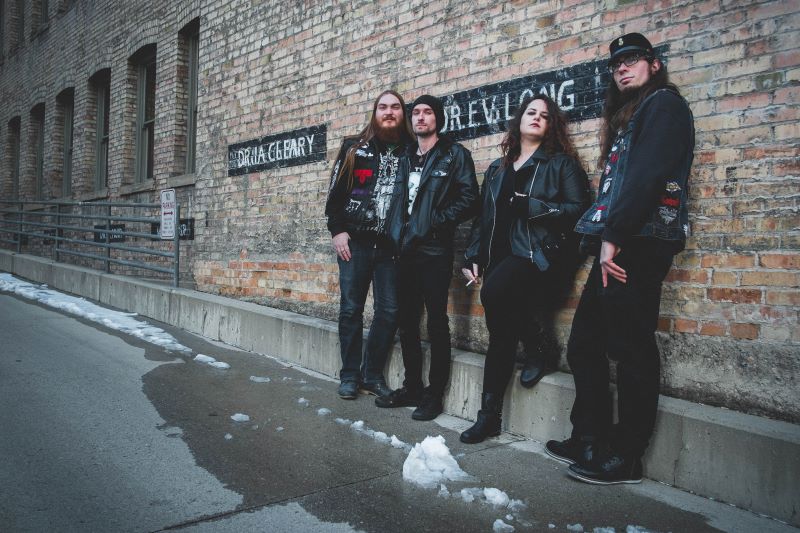
“To quote Step Brothers, it just feels good 'to make beautiful music for a sad world.'" - Sami Wolf, Moon Wizard
interview at
How did Moon Wizard form?
Aaron: Ashton, Joe, and I all played in a death metal band called Thalgora for five years when we were younger. I went to high school with Ashton, and then Joe was a friend of ours who played in a different band. We did that for a while, and then the band just fizzled out as we were growing up and figuring out how to be how to be adults and shit. Joe and I were always really into doom metal, and that was something I always wanted to try. So, we started jamming. We had some songs going with a rhythm guitarist friend of ours, and then shot some of it to Ashton. Ashton ended up being interested. We made our first album, Moon Wizard, just the three of us. With our second album we wanted to incorporate different vocals. I liked Joe's vocals, but we wanted something a little different. Luckily my wife worked with Sami. We met Sami and we loved her vocals, and she was cool to hang out with. We've been together ever since. We've made two albums since then with her.
What is the story behind the name Moon Wizard?
Aaron: I played a lot of Dungeons & Dragons back in the day. Our drummer's cousin, Braxton, he's my best friend, we had a joke D&D thing going on that there was a moon wizard who would go to different planets and basically do a bunch of crazy drugs. We had a story about the Moon Wizard fucking a volcano and doing acid on the moon—it was just a joke kind of character. We just thought it was a cool name, and we ran with it. Our first album cover has him on the moon drinking booze and smoking a cigarette. That's just kind of where we got it and thought it was funny.
Blame it on D&D and beer!
Aaron: Yeah, pretty much.
Sami, tell us your story. You're from the Chicago area?
Sami: Yeah, I'm from Chicago. I moved to Utah in 2019. I just needed to get out of Chicago. It wasn't doing me any favors at the time. So, I came out here. I joined up with the boys in 2020. I fell into the band because I worked with Aaron's wife at a dog daycare—I've been working with dogs my whole life. She made the introduction, and I auditioned for the band.
Did you previously sing in metal bands?
Sami: No, I don't come from a metal background. I took voice lessons all throughout high school. I was an acting major in college. I'm used to singing more, you know, quote unquote pretty. The music that I have always written, my style is very, like 70’s rock, Stevie Nicks-esque type vibes. So, it was more like, “Okay, I can sing this style. It's just a muscle I haven't yet exercised." It was a style that I was new to so, Joe took me under his wing because he was the one that was singing and writing the lyrics at that point.
How was the learning curve?
Sami: It was difficult for me because I was learning what they had already very cohesively written as a band. The Night Harvest, our first album together, was me getting my feet really wet and then also Joe handing off the baton. Whereas, with Sirens, I felt like I was more confident in what I was bringing to the table personally. I hit the ground running more with Sirens. I think there's a huge difference, not only in the mastering and production of the albums, but as a band. That's when we really meshed. The four of us got a really cohesive sound.
Essentially, I don't know how to conform to metal, so I just kind of made it conform to me. I'm like, “How do I make my voice sing in this way?” It was hard for me. It wasn’t easy to do. I'm a trained singer, but singing that way . . . I mean, my voice teacher in high school would have never let me attempt to sing that way, like the belting—not that I could even sing like that when I was 18. But I figured out how to make doom work for me. It's been really fun, a challenge.
Did they give you lots of homework, like "Here, listen to this Sabbath album or Green Lung?”
Sami: They sort of let me run. I'm still not really a metal head. I do love Black Sabbath, I absolutely do. I have a very eclectic taste. The boys don't really give me much homework. They let me have free reign. I mean, they definitely give me, like, you know, Hawkwind, Green Lung all those guys, but it's more the big picture.
The Night Harvest came out in 2020. That was the first album Sami was on. You recorded and released the album in the middle of Covid. What was that like?
Sami: It was kind of a blur, honestly. I recorded all of my vocals in one day for The Night Harvest. I don't know why I did that. It's fine, it happened and we're all here and it's fine, but I don't know why I necessarily chose to do that because that was just so much to put one's voice through in one day. The world to me just felt like a ghost town. It was also us culminating and putting this project together that we'd been rehearsing and working on for such a long time. We were just focused on working on it and cranking it out.
Aaron: I think we had a good amount of the music written for The Night Harvest prior to Covid. We were just wrapping stuff up. On the first two albums, we had a different route production wise. The drummer of Subrosa, Andy Patterson, did our first two albums and he just has a completely different recording style than what we did on Sirens. A lot of it was live takes. We didn't play to a metronome. We just did what we normally did jamming, and that's how we recorded the album. We did it in a short amount of time. When we did Sirens, we played to the click. We took a lot more time on the last album.
Sami: We really took time to refine Sirens. The producer, Randy Beasterfield, is an amazing collaborator. He really adds some magic to the whole thing. I think it's pretty stark when you hear the difference between The Night Harvest and Sirens. It's just two different production styles, but I think we really struck a good match with Randy in that regard.
It was about four years between The Night Harvest and Sirens. Was that the band songwriting or just dealing with Covid and the fallout from that?
Aaron: Someone moved back to Chicago [laughs].
Sami: For a year. It seemed like a good idea at the time, but it wasn't. After about a year of being there and just really missing the band and missing Utah and realizing that I was actually happier over in Utah, believe it or not. I called Aaron's wife, and I was like, "Jen, I think I want to come back." I think I really missed the band. It was kind of awkward because the boys had a new singer at that point. I think this was the third or the fourth singer that they had tried out, so I was little bit sheepish about coming back. You know, the prodigal daughter returns. I came back in 2022.
How were things coming back after a year away?
Sami: The boys had written most of Sirens. I was coming in with newer confidence and a renewed sense of passion for the band and just really wanting to double down on. I dealt with a very unexpected loss and grief, which tends to shelf creative pursuits. So, the boys have been very patient with me while I was navigating those personal things that unfortunately just completely tend to put a put a veil on your creative self. Then, of course, Aaron had a beautiful baby boy. We've all been going through a lot in these last few years; hence, the hiatus. But we're really excited about what we've got coming up, so I think it's been worth the wait.
Aaron: We also played a shitload of shows. We played a ton of shows in '23, '24. We had most of Sirens written in '24 and just needed vocals.
There's no title track on Sirens. Where did the title come from?
Aaron: We had a group chat going and we arrived at the idea of a beautiful woman on the ocean, kind of a dark atmosphere.
Sami: Under the moon.
Aaron: I think it was either me or Joe, one of us said ‘sirens’ because the mythological creature, the siren, and it stuck. Then MontDoom made the album artwork, and it worked.
Sami: There's the luring of sirens, you know, enticing sailors to their death, but I also think about it in terms of me moving back to Chicago. Coming back was sort of like calling myself back home in a way. I think about that too. The only reference of sirens is in "Epoch" with line "sing your siren song," but it is very thematic. Every song exemplifies its own chapter, but it with that doom metal epic type of storytelling.
It looks like Joe's leaving, is that right?
Aaron: Another person now lives in Kentucky.
Sami: Yeah, we love him dearly. We didn't want him to leave, but he's on to different pursuits. We, of course, wish him well and we miss him dearly but, yeah, he ended his line with us with Sirens.
Aaron: We're going to have three songs that Joe played on coming out soon on an EP soon, so we did have kind of one last hurrah with him. But, yeah, it'll be a new chapter.
You talked about the evolution of the band. How do you envision the band continuing to evolve going forward?
Aaron: With the music itself, the three new songs that we recently did, I experimented with different tunings. We dropped down a full step. I'm playing in C standard for a lot of the new songs. Then we noticed a lot of Sirens is kind of downtrodden. We noticed that when we play live we don't have a lot of songs that bring the energy up. So personally, for me, that's a goal that I wanted to set with some of the newer music. With the three new songs, all of them are really groovy. A couple of them are more upbeat, which is kind of what we want to do. I want to do more of a mix of both. I want to keep the sad shit that we normally write and incorporate some more stuff that we can play live a little easier.
I also noticed on Sirens that there was some repetition on some of the songs. Ash and I have always had a kind of keep it simple, stupid kind of thing. If it works, we need to play to the song. With these three new songs, I turned the guitar up more and just creatively did a lot of different stuff. I think we all did. So that's kind of the direction I'd like to go. We found what works with Sirens, and I want to take that and incorporate more interesting elements. I feel like Sirens was a solid 7 or 8 album, and I want to get closer to 9 and 10.
How has the reception been for Sirens? You signed with Hammerheart, so that's a good indication, but prior to that, did you have a sense that you made something really special?
Aaron: I really think we did. I mean, me, Ashton and Joe, we've been playing music together for over a decade, and between the three of us, we've written five albums. Sirens was the first time I remember all of us sitting in our studio and saying, "Hey, if there's anything that's going to hit 100,000 listens . . ." or "If there's anything that we did that's going to be successful, I really think this is it." Luckily, we put it into the world and that's the reception we got. And I'm very grateful for what has occurred. It's very humbling.
I remember when 666MrDoom reached out to us for The Night Harvest. I was like, "That's so fucking cool." Like, "Yes, please, I'll send it to you right now." Then when we released Sirens, I hit him up. He said, "Oh yeah, you guys are always welcome." I think that video on his channel is approaching 90,000 listens which blew my mind. We just looked and we have some of the highest views. I'm just really grateful people dig our shit.
Sami: We've gotten a lot of really good reviews in a short amount of time, and I'm overwhelmed in the best possible way. But it's like that kernel of self-doubt that we have as artists. Like you downplay it, but then you get this kind of reception, and it's very validating. It's not just us playing in the basement. People are into it. It's super humbling. It's so cool to have so much reach. We've gotten a lot of fans in Europe and obviously Hammerheart is based out of the Netherlands. I wasn't expecting that kind of reception to be honest with you. I'm super excited for what's to come.
How did Hammerheart find you?
Aaron: Guido Heijnens, from Hammerheart, messaged our band email and just had some questions and said he'd give us a shot. Surprisingly, until he reached out, I'd never heard of Hammerheart, which is crazy because they've released so many of my favorite bands. Working with Guido and all the Hammerheart team has been such a cool experience. I thought we were going to be an independent band forever, but I really saw the just kind of the positives you can get from having a label, and it's just been nothing but a cool experience.
What's the music scene like in Salt Lake?
Aaron: I'd say it's pretty healthy. Unfortunately, a lot of our venues have been shut down over the last five years. I think Covid had a lot to do with it. But there was a bar built two or three years ago called Aces High. It's a metal bar. I feel like that's been really cool for the Metal community. We've been playing in bands for years. There's some of these guys that are still in active bands that I went to middle school with that are still friends of mine. I've always enjoyed playing shows out here. I'm sure it's nothing like Denver or San Francisco or Portland or anything, but I feel like there's a lot of metal out here.
Sami, you're coming from Chicago. Did you notice a big difference in the Salt Lake scene?
Sami: Chicago's a humongous city, comparatively. It's the third largest city in the country. It's huge. The entire music scene is so much bigger. There's a blues scene, there's a huge punk scene, there's so much going on there just by sheer volume. Chicago is obviously a very lively city for all that entertainment and, of course, live music. Salt Lake has a pretty robust scene for the fact that it is a smaller city. I think it has a pretty good circuit of metal bands. We've played with Simian a bunch. There's a lot of good local bands like Arsenic Addiction. There's a lot of good contenders out here despite the scene being smaller.
Salt Lake City is known as a Mormon city. Does that have a dampening effect on the scene?
Aaron: We get the stigma of the Mormons, but that always makes me laugh. We get that online, too. They're like, "Oh, we didn't know Mormons can make metal." People just assume that if you're in Utah, you're Mormon. Surprisingly, though, I think Utah has a very strong counterculture because of the Mormons. We have something out here called The Oddities & Curiosities Expo where it's just weird shit. We also have a Tattoo Expo. You would never believe the number of alternative people that are here. It makes you feel at home. I have nothing against the Mormons. They're all great people for the most part, but we do have that stigma here in this state. Ultimately, though, I think it feeds into the counterculture.
Tell us about your musical influences. What bands have influenced your musical approach?
Aaron: I grew up on 80’s metal like Metallica, Megadeth, Iron Maiden, that kind of stuff. Then as I got older, I got into Death and Obscura and got really into tech death bands and then Dimmu Borgir and, Unanimated, Immortal, a bunch of black metal. Then I started smoking a lot of weed and got into bands like Sleep and Mastodon and Earth and stuff like that. It wasn't until we started playing doom that I really appreciated bands like High On Fire and Green Lung. Now I'm so delved into that scene. I also love stoner rock. Nowadays I have such a crazy catalog of music I like. I love bluegrass, black metal, doom. It kind of depends on how my day feels. And I like country. I love it all, but I'll always be a metal head at heart.
Sami: I grew up listening to what my mom listened to, and that was very much 60s and 70s rock and a lot of Motown. I love that soul, Motown. You probably can hear that. I love to do riffs and to belt and do all that stuff. But I've also seen Stevie Nicks three times. I also obsessed with Heart. Those female powerhouses, that 70s psychedelic rock. For me, that's it. That's where it's all very yummy for me. I love that sound. Again, I'm not a metal head at heart, I'm more of a hippie's child. But I mean, yeah, those are definitely my roots. Is that the time before me? For sure.
So you'll be doing a EP ahead of another full length?
Aaron: Yeah, we decided to go the EP route because those three tracks are the last ones with Joe on them. Once we get a new bass player, and then we'll start just kind of hucking out music. I have a backlog of so many riffs, and Ashton and I just have a lot of ideas too. I think we can get another album going pretty quick after the EP.
Any special message for the Metal Temple readership out there?
Aaron: It blows my mind every time I open the Spotify for artists app and I see people listening to us from Sweden and Norway and Australia and Argentina and Brazil and just all over the world. I think that's the beauty about playing music nowadays. If you would have told me someone would listen to our music in New Zealand . . . that's crazy to me. So, to all of our fans that have listened to any of our catalog, it's very cool. Honestly, that's why I play music. It's not for money. It's not for anything other than I've always liked jamming with my homies. I feel like we make good music, and the fact that people are willing to listen to it and like what we do—well, that's the ultimate goal. That's all I really care about. If people dig our shit and they tell us they dig our shit, that means the world to me.
Sami: The support we have gotten locally and globally has been overwhelming. Super humbling. For all the fans that are sticking with us through our humble beginnings, we just appreciate every single person. We've had so much outreach from so many different corners of the world. It blows my mind. I have nothing but gratitude and appreciation for everybody that listens. And to Aaron's point, quoting Step Brothers, it just feels good “to make beautiful music for a sad world.”
Aaron: I'd like to thank Hammerheart. It's a cool new partnership we have and they're fantastic. And our string and pick manufacturer, Black Harbor as well. They're local guys, and they make great things. They've been supporting us for five years, so everyone we've worked with in the music industry have just been great.
Sami: Yeah, everybody's been fantastic and awesome to work with. So, we're just so excited to keep the ball rolling.
More results...
